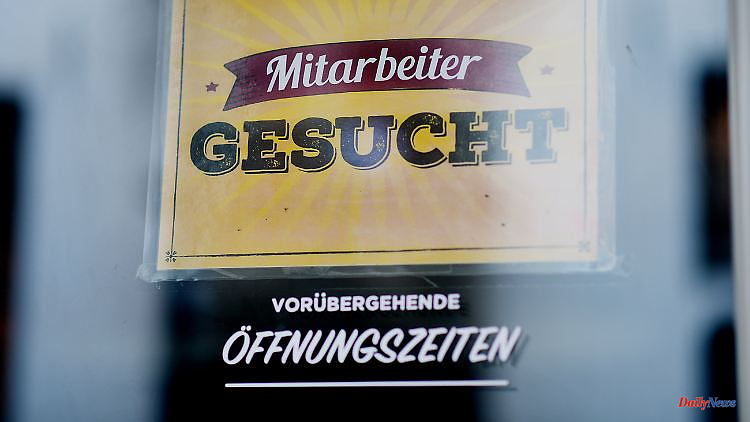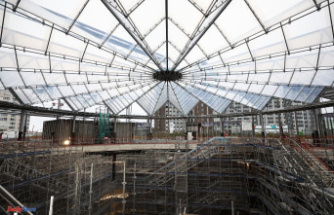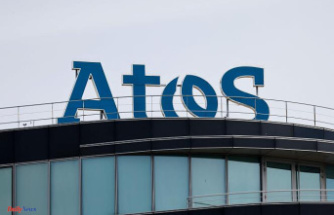The first corona infection in Germany was confirmed three years ago, by an employee of the Bavarian automotive supplier Webasto. Two months later, cafés, pubs and restaurants nationwide have to close. In April 2020, the federal government decided on aid programs worth billions for the catering trade and other companies. With success: Although almost 25,000 companies in the hospitality industry have to close forever, in retail there are even 41,000 shops. In other sectors, on the other hand, the feared death of large companies does not materialize.
Various sectors of the economy are also losing staff on a massive scale, but less blatantly than it initially appears. Employees are now returning to the catering trade. Nevertheless, sectors that have been hit particularly hard by the pandemic are again calling for state aid. Because the next crisis has long since begun. A balance sheet for the hospitality industry, event industry, travel industry and trade:
For the German hospitality industry, the corona pandemic means a real bloodletting, as the general manager of the German Hotel and Restaurant Association (DEHOGA), Ingrid Hartges, calculates to ntv.de. Just one year after the start, the Federal Statistical Office counts eleven percent fewer companies in the catering and hotel industry than in the pre-Corona year 2019. Almost 25,000 companies have to close forever. For the first time since reunification, the total has slipped below 200,000.
The so-called beverage-oriented gastronomy, i.e. bars and pubs, but also discotheques, are particularly hard hit. Here, with almost 8450, more than every fifth company has to give up. In the accommodation industry, with almost 4,000 hotels and other accommodations, a good nine percent are permanently closed. In the food-oriented gastronomy, it is hardly less at almost eight percent, almost 10,000 restaurants, cafés, snack bars and pubs.
According to Hartges, 2022 is the third year of losses in a row. Adjusted for inflation, sales were about eleven percent below those of 2019. After all, the sales losses have been falling for several months.
In addition, since the end of the strict corona rules, many employees have returned, as Hartges reports. While the industry lost more than 14 percent of employees subject to social security contributions at its peak in May 2021, last October there were not even 4 percent fewer workers in the sector than before the crisis. The new training contracts are also only a good six percent below the pre-crisis level.
However, nearly 32,700 hospitality jobs remain unfilled. The head of the association even assumes a much higher number, since not all companies report their jobs to the employment agencies. "As a result of the lack of employees, many companies are being forced to shorten opening hours, introduce rest days, optimize the menu offerings or switch to self-service for certain dishes," says Hartges.
The guests are now coming back. "After the Corona requirements were lifted in May, demand in most of our companies has developed well," reports Hartges. "Many of the restaurants and hotels are very satisfied with the course of the summer season," says the industry representative. Market research institutes assume that customers will spend about the same amount of money on food and drinks away from home this year as they did in 2019. Guests may not come quite as often, but if they do, they will spend significantly more.
But after the massive loss of sales, the reserves of the companies are exhausted, Hartges clarifies. The catching-up process is also made more difficult by the massive effects of the Ukraine war. "The aftermath of the Corona crisis is encountering an unprecedented crisis cocktail of labor shortages, historical inflation rates, interrupted supply chains, material shortages and political uncertainties." After the pandemic, the companies suffered particularly badly from the high costs of energy, food and staff. In order to get the costs under control, the industry is again asking for political support.
The Federal Association of the Concert and Event Industry (BDKV) also points to a risky and strenuous new start against the background of inflation, the energy crisis and a shortage of skilled workers. "This is pushing some member companies to the edge of their options and we are therefore already seeing individual closures," says BDKV Managing Director Johannes Everke ntv.de.
"Less money is currently being spent on culture as a whole," reports Everke. "A few can afford more, but most have to save." Actually, the organizers should therefore demand higher prices, but that would run counter to the goal of attracting new viewers. "The situation is complex," notes Everke.
In direct connection with the corona pandemic, on the other hand, none of the member companies had to close permanently - thanks to the state aid. In view of the depleted financial reserves, the organizers are calling for new aid programs based on the model of Hamburg, which is funding cultural events with a further nine million euros after the end of federal funding.
The industry is divided: on the one hand "an oversupply due to catch-up concerts and a veritable wave of tours by the biggest stars, on the other hand postponements or cancellations due to low advance sales and the sword of Damocles of cancellations caused by the pandemic, which nobody can insure," reports Everke. "Large event organizers are sometimes posting record sales, while smaller ones are trying to get close to the pre-crisis level." Overall, concerts are currently 40 percent less busy.
Some events also burst because there is a lack of staff. "Tour organizers who rely on freelancers and service providers are particularly affected," explains Everke. Twelve percent of the staff have been lost since 2019, a quarter of which have migrated to other industries. Nevertheless, the association expects full houses across the board in the future.
In the travel industry, the federal government's aid packages also prevented a large wave of insolvencies, even if individual companies had to give up, as the German Travel Association (DRV) reported on ntv.de request. In the first year of Corona, the turnover of tour operators collapsed by almost a third, specifically 12.5 billion euros. But in the summer of 2021, the package tour celebrated its comeback.
In winter there were no bookings again, but the summer of 2022 showed: “The Germans’ desire to travel is back,” says DRV spokeswoman Kerstin Heinen. In 2020, the proportion of the population that travels fell from a good 78 to 63 percent; In 2021, the proportion rose again to almost 68 percent. Travelers also spent more money: spending per person per night rose by an average of 15 percent, especially because fancier hotels or rooms were booked.
For the past tourism year up to last October, the industry is still expecting a drop in sales in the low double-digit range compared to 2019. In the year before Corona, however, German travel providers had achieved record sales. According to surveys among Germans, travel is at the top of the consumption wish list for the current year, as Heinen reports.
Because of the Ukraine war and the high inflation, the providers assume that "price sensitivity" will increase. Nevertheless, the industry is expecting high demand for cruises and long-distance travel, as was the case last year. After customers increasingly booked at very short notice during the course of the pandemic, the association is currently observing an increase in early bookings again. Security in the form of package tours and flexibility for rebookings or cancellations remain important for travelers.
At the same time, the association reports a shortage of workers and skilled workers "more acute than ever". 70 percent of the companies surveyed in the fall stated that they had difficulties filling vacancies. "The flight chaos last summer clearly showed the consequences of a lack of workers," says Heinen. "That must not be repeated this summer."
In contrast to travel providers and tour operators, the pandemic brought many retailers to the brink of existence, as the German Retail Association (HDE) reports. "A quiet death could be observed," says managing director Stefan Genth ntv.de. "Since 2019, the number of stores has decreased by 41,000." Consumer sentiment plummeted, at times sales in some retail areas were 80 percent below the pre-crisis level, according to Genth. For example, while products for your own four walls were booming, consumers were buying less special clothing items.
Thanks to short-time work, the retail trade was even able to increase the number of employees subject to social security contributions to more than 3.1 million people, as Genth reports. Accordingly, online sales also increased, to 40 percent today above the pre-crisis level. "In the past Christmas business, for example, a normalization of sales could be seen in online trading," explains the head of the association.
The reason is the new crisis: "Due to the Russian war of aggression in Ukraine and the development of energy prices, the retail trade has remained in crisis mode," says Genth. "Consumer sentiment has hit rock bottom."












